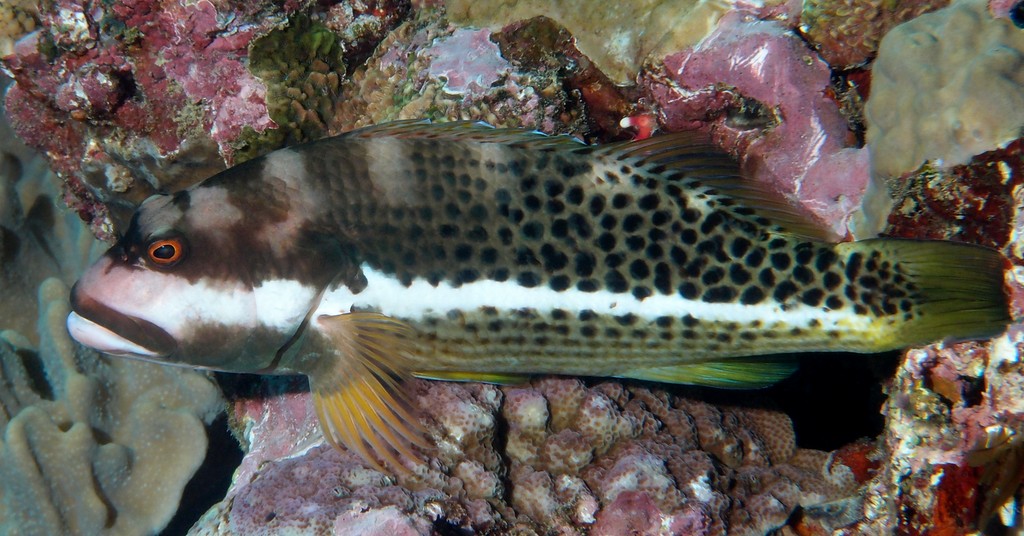PARACIRRHITES HEMISTICTUS - (GUNTHER, 1874)
Actinopterygii (Gigaclass) > Actinopteri (Class) > Teleostei (Subclass) > Centrarchiformes (Order) > Cirrhitioidei (Suborder) > Cirrhitidae (Family) > Paracirrhites (Genus)
Épervier tacheté, Halfspotted hawkfish, Ornate hawkfish, Half-dotted hawkfish, Multicolored hawk-fish, Halbgefleckter korallenwächter, Irezumigonbe, イレズミゴンベ, 杂色副䱵,
Synonymes
Cirrhites hemistictus (Günther, 1874)
Cirrhites polystictus (Günther, 1874)
Paracirrhites polystictus (Günther, 1874)
Paracitthites hemistictus (Günther, 1874)
Parracirrhites hemistictus (Günther, 1874)
---------------------------
Description
Dorsal spines (total): 10; Dorsal soft rays (total): 11; Anal spines: 3; Anal soft rays: 6; Uppermost and lower 7 pectoral rays unbranched; Lateral line scales: 48-51; Snout almost entirely scaled; Body elongate for the genus. Snout depth: 2.8-3.2 in SL. Max. Length: 29.0 cm TL, usually: 20.0 cm TL. Depth range: 1 - 20 m.
Color
Two color phases, not related to sex:
First phase greenish on back, densely spotted with black pale yellow below with series of dark yellow spots following scale rows; An irregular white stripe slightly below midside of body with a few black spots below and occasionnally within stripe; Head greenish to pinkish grey; Fins yellowish.
Second phase grey with numerous close-set dark brown spots on body and a white or pale pink spot slightly smaller than eye on upper side in middle of body.
Etymology
Paracirrhites: from Greek prefix, para- = resembling to + from Latin, cirrus = curl, fringe.
hemistictus: from Greek, hemi = half + from Greek, stictus = spotted, dotted.
Original description: Cirrhites hemistictus Günther, 1874 - Type locality: Society Islands, South Pacific Ocean, part of French Polynesia.
Distribution
Eastern Indian Ocean and western Pacific: Christmas Island and Cocos Keeling Islands, east to Line Islands and Pitcairn Islands, north to Amami Islands (Japan) and Ogasawara Islands (Japan), south to Australia and New Caledonia.
Synonymes
Cirrhites hemistictus (Günther, 1874)
Cirrhites polystictus (Günther, 1874)
Paracirrhites polystictus (Günther, 1874)
Paracitthites hemistictus (Günther, 1874)
Parracirrhites hemistictus (Günther, 1874)
---------------------------
Description
Dorsal spines (total): 10; Dorsal soft rays (total): 11; Anal spines: 3; Anal soft rays: 6; Uppermost and lower 7 pectoral rays unbranched; Lateral line scales: 48-51; Snout almost entirely scaled; Body elongate for the genus. Snout depth: 2.8-3.2 in SL. Max. Length: 29.0 cm TL, usually: 20.0 cm TL. Depth range: 1 - 20 m.
Color
Two color phases, not related to sex:
First phase greenish on back, densely spotted with black pale yellow below with series of dark yellow spots following scale rows; An irregular white stripe slightly below midside of body with a few black spots below and occasionnally within stripe; Head greenish to pinkish grey; Fins yellowish.
Second phase grey with numerous close-set dark brown spots on body and a white or pale pink spot slightly smaller than eye on upper side in middle of body.
Etymology
Paracirrhites: from Greek prefix, para- = resembling to + from Latin, cirrus = curl, fringe.
hemistictus: from Greek, hemi = half + from Greek, stictus = spotted, dotted.
Original description: Cirrhites hemistictus Günther, 1874 - Type locality: Society Islands, South Pacific Ocean, part of French Polynesia.
Distribution
Eastern Indian Ocean and western Pacific: Christmas Island and Cocos Keeling Islands, east to Line Islands and Pitcairn Islands, north to Amami Islands (Japan) and Ogasawara Islands (Japan), south to Australia and New Caledonia.
Biology
An uncommon species that inhabits exposed reef fronts and outer reef slopes where it perches on rocks and corals. Feeds on small crustaceans and fishes.
An uncommon species that inhabits exposed reef fronts and outer reef slopes where it perches on rocks and corals. Feeds on small crustaceans and fishes.
Similar species
Cirrhitus pinnulatus (Forster, 1801) - Reported from New Caledonia.
Cirrhitus pinnulatus (Forster, 1801) - Reported from New Caledonia.
Last update: 2, October 2024
